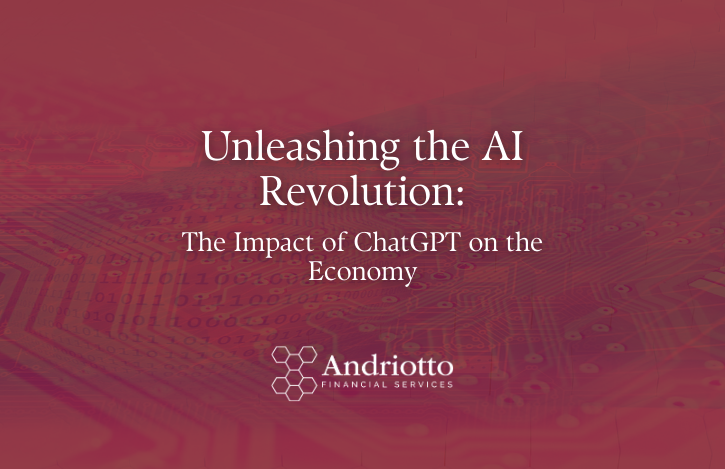In the ever-evolving landscape of technology, the emergence of artificial intelligence (AI) has been nothing short of revolutionary. Among the myriad of AI innovations, one stands out: ChatGPT, a text-generating marvel developed by OpenAI. This ground-breaking technology has ushered in a new era of possibilities, sparking a frenzy of innovation and investment as businesses race to harness its potential. However, amidst the excitement around this whole AI revolution, questions loom about the broader implications of ChatGPT for the economy, particularly in relation to jobs, productivity, and inequality.
The AI Gold Rush: Opportunities and Challenges
The past few months have witnessed an unprecedented AI gold rush, with app developers, start-ups, and corporate giants all vying to capitalise on ChatGPT and other generative AI models. The allure of these technologies lies in their ability to automate tasks once considered the exclusive domain of human creativity and reasoning. From content generation to data analysis, the potential applications are vast and varied. However, as companies vie to stake their claim in this burgeoning industry, economists are grappling with the implications for the workforce and the economy at large.
Exploring the Potential of Generative AI
Generative AI models like ChatGPT and DALL-E 2 represent a new frontier in AI technology. Trained on vast amounts of data, these models continue to evolve rapidly, boasting ever-increasing capabilities. In fact, the ease of use and practicality of ChatGPT have captured the imagination of entrepreneurs and business leaders, signalling the potential for widespread adoption across industries. However, amidst the excitement, concerns linger about the impact of these technologies on job displacement and income inequality.
The Promise of Automation: A Double-Edged Sword
At the heart of the AI revolution lies the promise of automation, with generative AI models like ChatGPT poised to transform the way we work. Tasks once deemed the sole domain of human creativity and reasoning are now within the grasp of machines. While this presents exciting opportunities for innovation and efficiency, it also raises questions about the future of employment and income distribution. Will AI augment human labour, freeing workers to focus on more complex tasks, or will it lead to widespread job displacement and growing income inequality?
Navigating the Impact on Jobs and Productivity
The impact of ChatGPT on jobs and productivity is a subject of intense debate among economists. While some envision a future where AI empowers workers and enhances productivity, others fear widespread job displacement and growing income inequality. Studies suggest that generative AI could affect a significant portion of the workforce, with tasks once deemed creative now within the realm of automation. However, the extent to which AI will reshape the labour market remains uncertain. Will it lead to a more equitable distribution of wealth and opportunity, or will it exacerbate existing disparities?
The Role of Education and Upskilling
As the AI revolution unfolds, the role of education and upskilling becomes increasingly critical. Empowering workers with the skills needed to thrive in the digital age is essential to mitigating the potential negative impacts of automation. By providing accessible training and education opportunities, we can ensure that workers are equipped to adapt to the changing demands of the workforce. However, achieving widespread upskilling will require concerted efforts from governments, businesses, and educational institutions alike.
Toward Inclusive Growth: Opportunities for Shared Prosperity
While challenges abound, there is room for optimism. Preliminary findings suggest that ChatGPT could narrow the performance gap among workers, upskilling individuals and broadening their opportunities. By providing practical tools for skill enhancement, generative AI has the potential to revitalise the workforce and spur economic growth. However, achieving inclusive growth will require a concerted effort to address the barriers to participation and ensure that the benefits of AI are shared equitably. As we navigate the complexities of the AI revolution, let us seize the opportunity to build a future of shared prosperity and opportunity for all.
Charting the Path Forward
The AI revolution holds the promise of transformative change, but its success hinges on our ability to navigate the opportunities and challenges it presents. By embracing innovation, prioritising inclusive growth, and investing in education and upskilling, we can harness the full potential of ChatGPT and generative AI to create a future of shared prosperity and opportunity. As we chart the path forward, let us seize the promise of the AI revolution and build a better future for all.
At AFS, we are passionate about fostering innovation and empowering ambitious minds to flourish. Our mission is to provide best-in-class financial services for traditional and crypto deals, exploit European grants, and use quantitative methods to improve clients’ performance. We aim to help our customers unlock their full business potential.
Let’s unlock your enterprise’s full potential together!
Get in touch at [email protected].


